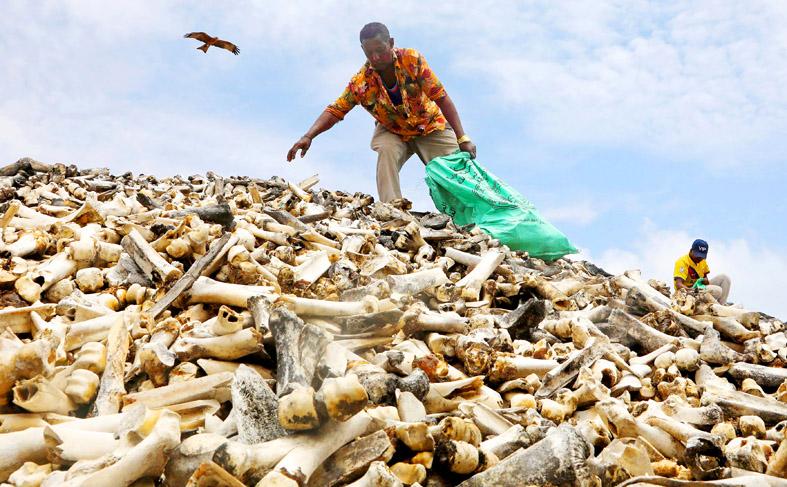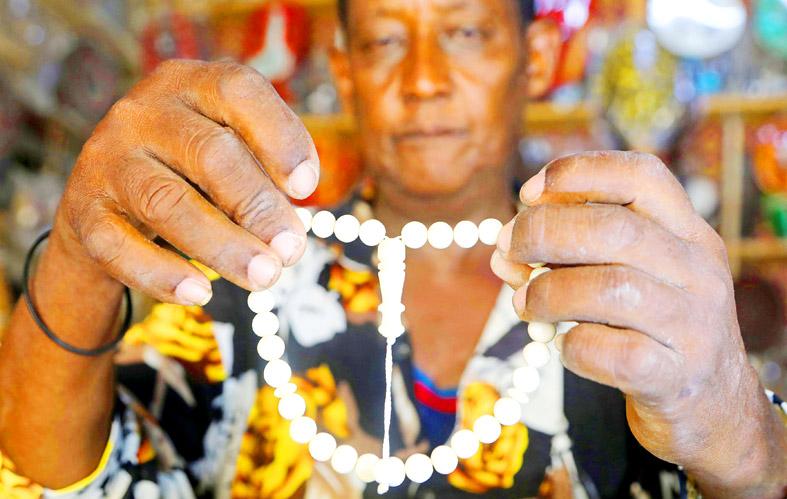Somalian artisan Muse Mohamud Olosow carefully sorts through a huge pile of camel bones, discarded by a slaughterhouse in Mogadishu, selecting pieces that he would carve into jewelry and ornate beads used by fellow Muslims while reciting prayers.
Olosow, 55, has endured hardships to keep his trade alive. In 2006, he was shot in the arm by the brother of the owner of a camel bone heap where he sifts for material.
To Olosow’s knowledge, he is one of just four artisans in his country of 16 million people who work with the bones of camels.

Photo: Reuters
In 1978, in one of Somalia’s many periods of war and turmoil, dozens of craftsmen were killed in Mogadishu and another town by gunmen, he said.
For years, he carved his bones secretly at home and then took them to markets to sell discreetly.
Olosow, whose strong hands and arms bear callouses and muscles from his work, learned his craft from his father in 1976.

Photo: Reuters
He plans to ensure this decades-old tradition does not fade away after he is gone.
“My kids will inherit these skills from me that I inherited from my father. I do not want these skills to stop,” he said from his workshop in the Somalian capital, Mogadishu, surrounded by bones.
His clients are mostly government officials or wealthy Somalians living abroad. Just one of his painstakingly carved prayer beads can cost about US$50, in a country where seven in 10 people live on less than US$2 per day.
A customer visiting his shop said the work justified the price.
“What matters is quality not price. I prefer this one to beads imported from other countries like China,” the customer said.
Somalia is home to the world’s largest camel population, and pastoralism of camels and other livestock provide livelihoods for 60 percent of the population, a 2019 US government study found.
For Olosow and his family, carving bones has been their main source of income for decades. They invested nearly US$5,000 to import machines from Italy to chisel and puncture the tough bones, he said, making it faster and safer to work “without bruises.”
Painstaking work by hand, passed down by his father, is what yields some the details that make his jewelry and beads distinctive.
He dreams of selling his work abroad.
“Our plan is to export these items to other countries. We shall continue this art craft until we become rich. God willing,” he said.

Kehinde Sanni spends his days smoothing out dents and repainting scratched bumpers in a modest autobody shop in Lagos. He has never left Nigeria, yet he speaks glowingly of Burkina Faso military leader Ibrahim Traore. “Nigeria needs someone like Ibrahim Traore of Burkina Faso. He is doing well for his country,” Sanni said. His admiration is shaped by a steady stream of viral videos, memes and social media posts — many misleading or outright false — portraying Traore as a fearless reformer who defied Western powers and reclaimed his country’s dignity. The Burkinabe strongman swept into power following a coup in September 2022

‘FRAGMENTING’: British politics have for a long time been dominated by the Labor Party and the Tories, but polls suggest that Reform now poses a significant challenge Hard-right upstarts Reform UK snatched a parliamentary seat from British Prime Minister Keir Starmer’s Labor Party yesterday in local elections that dealt a blow to the UK’s two establishment parties. Reform, led by anti-immigrant firebrand Nigel Farage, won the by-election in Runcorn and Helsby in northwest England by just six votes, as it picked up gains in other localities, including one mayoralty. The group’s strong showing continues momentum it built up at last year’s general election and appears to confirm a trend that the UK is entering an era of multi-party politics. “For the movement, for the party it’s a very, very big

ENTERTAINMENT: Rio officials have a history of organizing massive concerts on Copacabana Beach, with Madonna’s show drawing about 1.6 million fans last year Lady Gaga on Saturday night gave a free concert in front of 2 million fans who poured onto Copacabana Beach in Rio de Janeiro for the biggest show of her career. “Tonight, we’re making history... Thank you for making history with me,” Lady Gaga told a screaming crowd. The Mother Monster, as she is known, started the show at about 10:10pm local time with her 2011 song Bloody Mary. Cries of joy rose from the tightly packed fans who sang and danced shoulder-to-shoulder on the vast stretch of sand. Concert organizers said 2.1 million people attended the show. Lady Gaga

SUPPORT: The Australian prime minister promised to back Kyiv against Russia’s invasion, saying: ‘That’s my government’s position. It was yesterday. It still is’ Left-leaning Australian Prime Minister Anthony Albanese yesterday basked in his landslide election win, promising a “disciplined, orderly” government to confront cost-of-living pain and tariff turmoil. People clapped as the 62-year-old and his fiancee, Jodie Haydon, who visited his old inner Sydney haunt, Cafe Italia, surrounded by a crowd of jostling photographers and journalists. Albanese’s Labor Party is on course to win at least 83 seats in the 150-member parliament, partial results showed. Opposition leader Peter Dutton’s conservative Liberal-National coalition had just 38 seats, and other parties 12. Another 17 seats were still in doubt. “We will be a disciplined, orderly